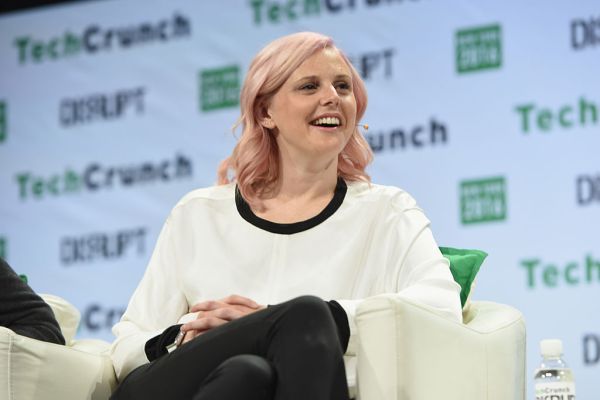The events of the past few months have shaken the lives of everyone, but especially Black people in the U.S. COVID-19 has disproportionately impacted members of the Black community while police violence has recently claimed the lives of George Floyd, Tony McDade, Breonna Taylor, Rayshard Brooks and others.
Two weeks ago, two Black transgender women, Riah Milton and Dominique “Rem’mie” Fells were murdered. In light of their deaths, activists took to the streets to protest the violence Black trans women face. Two days after Floyd’s killing, McDade, a Black trans man was shot and killed by police in Tallahassee, Florida.
In light of Pride month coinciding with one of the biggest racial justice movements of the century amid a pandemic, TechCrunch caught up with Robyn Exton, founder of queer dating app Her, to see how her company is navigating this unprecedented moment.
Exton and I had a wide-ranging conversation including navigating COVID-19 as a dating startup, how sheltering in place has affected product development, shifting the focus of what is historically a month centered around LGBTQ people to include racial justice work and putting purpose back into Pride month.
“Pride exists because there is inequality within our world and within our community and still there is no clear focus on what it is we should be fighting for as a community,” Exton says. “It almost feels like since equal marriage was passed, there’s a range of topics but no clear voice saying this is what everyone should focus on right now. And then obviously everything changed after George Floyd’s murder. Over the course of the following weekend, we canceled pretty much everything that was going out that talked still about Pride as a celebration. Especially for Black people within our community, in that moment of so much trauma, it felt completely wrong to talk about Pride just in general.”
Worldwide, Pride events have been canceled as a result of the pandemic. But it gives people and corporations time to reflect on what kind of presence they want to have in next year’s Pride celebrations.
“We’ve reached this point where parades are inaccessible to most grassroots advocacy organizations and we still have the Target and Urban Outfitters collections who maybe give 2% back to an LGBTQ charity,” Exton says. “This feels like hopefully a turning point to refind a purpose of what Pride should be about or how it started anyway.”
The goal isn’t for Pride to have zero aspects of celebration, but right now Exton says she’s thinking about shifting some of the focus to showing how there “is huge inequality and justice for Black LGBTQ people, particularly for Black trans people,” she says. Through this month, Exton says there is an opportunity to keep raising awareness around the amount of violence Black trans women face.
Queer dating during COVID-19
When the COVID-19 pandemic hit, those looking for dates didn’t seem to think the shelters in place throughout the country would last that long, Exton says. They were lining up dates, getting ready to hit the town when it was all “over,” she says.
“It’s been wild,” she says. “Honestly, I think it’s kind of been a barometer for human psychology. When lockdown first happened, there were downtrends as everyone was uncertain and then as people moved into sheltering at home, the numbers started dramatically going up. It was mainly driven by conversation.”
Exton says usage was primarily driven by in-app conversation. In California, for example, Her noticed a 20% increase in messaging once the state went into lockdown, with about 4,000 messages exchanged per day. About six to eight weeks into sheltering in place, usage went back down.
“Our view on that is no one knew when the endpoint was going to be,” Exton says. “At first it was like, great, I’m going to date online and then as soon as we get out of this, I’m going to have all these people teed up. And then that became unlikely so everything just slowed down a lot.”
At the start of the pandemic, Her had begun talking about integrating video messaging into the app because it had been on the roadmap. It’s not something Her has added just yet, but it’s been experimenting with online speed dating, using a third-party platform called Icebreaker, to see how people want to use video. In the first four weeks of sheltering in place, Her threw about 68 different events online.
“So we had this extensive, rapid learning process, which set us up to run these speed dating events,” Exton says. “It’s been a great way to open up this different part of the business that I don’t think we would have thought about doing. I think definitely we will carry on doing this once the world opens up.”
“First dates post-COVID are going to be so different,” she says. “I do think having a video date before meeting up is brilliant and I do hope it will stay post-corona.”
Next year, during a time when COVID-19 is hopefully not as big of an issue and the collective consciousness of society has perhaps moved on from the racial injustices that are so top of mind today, Exton hopes companies won’t revert to their “tick the box exercise” of buying floats in parades.
“At the moment, I hope companies are thinking honestly about, ‘what is the experience for our Black employees, for our Black communities, for our Black users and they’re actually talking about making organization-led change to improve whatever they’re doing. And I would hope that when Pride comes around next year, they have a similar actionable conversation and not just the easy access route of paying to perform.”
